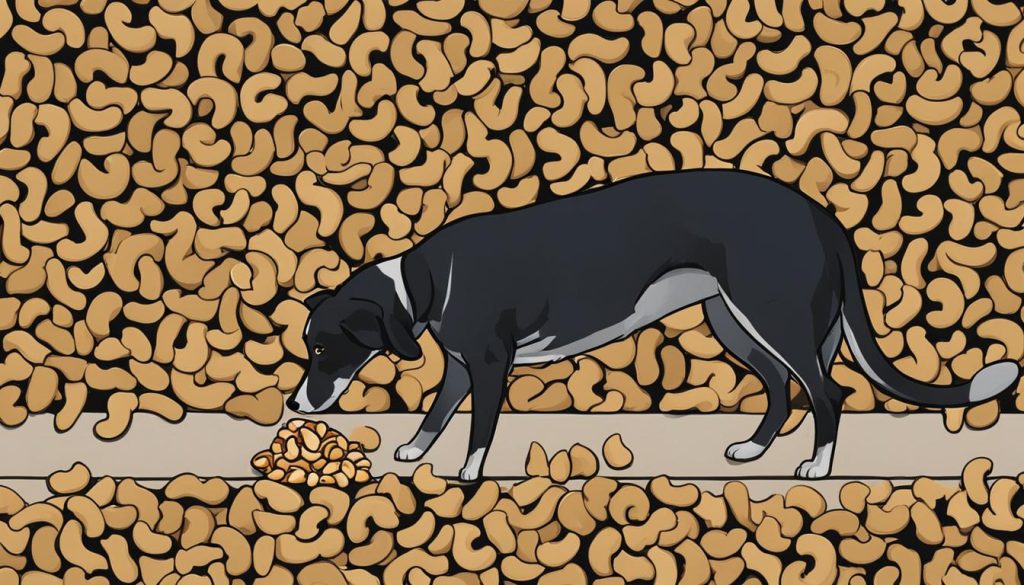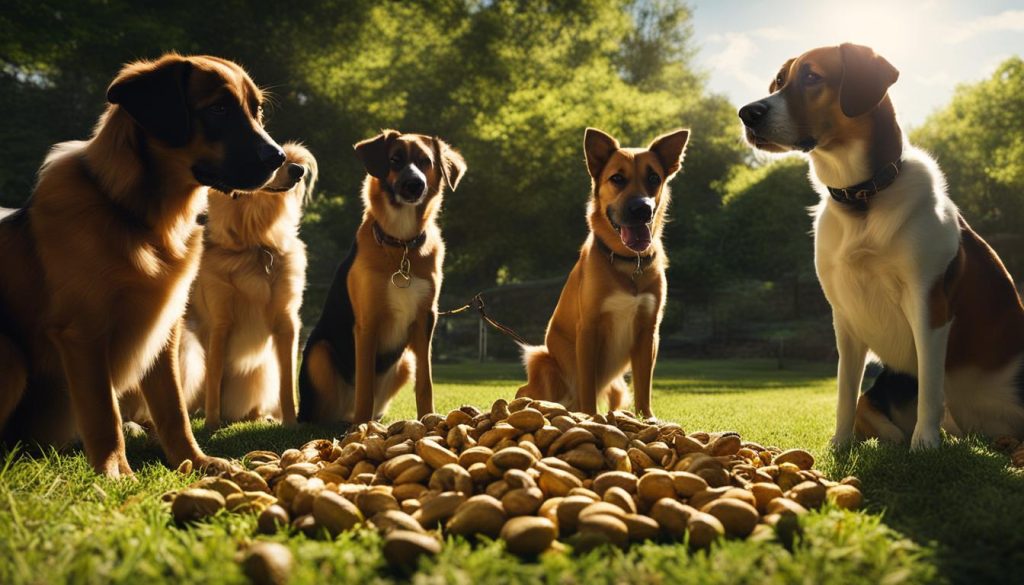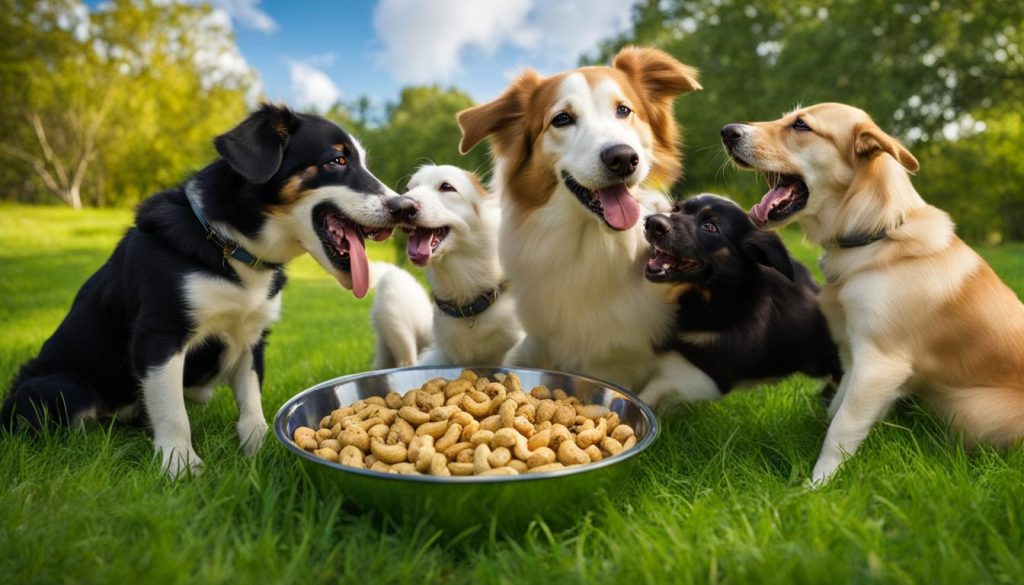As a professional copywriting journalist, I am here to provide you with all the information you need about dogs and cashews. Many dog owners may wonder if it’s safe to feed their furry friends cashews or if there are any health benefits associated with this nut. In this article, I will delve into the topic, discussing the risks and benefits of feeding cashews to dogs and providing expert insights and recommendations. So, let’s get started!
Key Takeaways:
- Cashews are generally safe for dogs to eat, but should be given in moderation.
- Feeding cashews to dogs can provide omega-6 fatty acids, antioxidants, fiber, protein, vitamins, and minerals.
- Risks of feeding cashews to dogs include obesity, pancreatitis, and the presence of other toxic nuts.
- Dogs can be intolerant to the fat in cashews, resulting in vomiting or diarrhea.
- When feeding cashews to dogs, offer plain, unsalted cashews and monitor for any adverse reactions.
Are Cashews Good for Dogs?

When it comes to cashews and dogs, many pet owners wonder if these tasty nuts are safe and beneficial for their furry companions. Let’s explore the health benefits of cashews for dogs and understand if dogs can have cashews.
Cashews offer several nutrients that can be beneficial to dogs. They contain omega-6 fatty acids, which help control inflammation and promote a soft and shiny coat. Additionally, cashews are a good source of antioxidants, fiber, protein, along with various vitamins and minerals. These nutrients can contribute to your dog’s overall health and well-being.
However, cashews should only be given to dogs in moderation. Cashews are high in fat, which can lead to weight gain, obesity, and pancreatitis in dogs. Therefore, it’s crucial to offer cashews as an occasional treat and ensure they are plain and unsalted. Feeding cashews in large quantities or on a regular basis can have adverse effects on your dog’s health.
Remember, every dog is different, and some dogs may have sensitivities or allergies to certain foods, including cashews. It’s always best to consult with your veterinarian before introducing new foods into your dog’s diet, including cashews. They will be able to provide personalized advice based on your dog’s specific needs and health conditions.
The Health Benefits of Cashews for Dogs
“Cashews are a great source of omega-6 fatty acids, antioxidants, and other essential nutrients that can support your dog’s health. However, it’s important to remember that moderation is key. Too many cashews can lead to weight gain and other health issues.”
– Dr. Amanda Patterson, DVM
Table: Nutritional Profile of Cashews for Dogs
| Nutrient | Amount per 1 oz (28g) |
|---|---|
| Protein | 5.2g |
| Fat | 13g |
| Carbohydrates | 9.2g |
| Fiber | 0.9g |
| Vitamin E | 0.3mg |
| Magnesium | 83mg |
| Phosphorus | 168mg |
Source: USDA National Nutrient Database
Risks of Feeding Cashews to Dogs
When it comes to feeding cashews to dogs, there are several risks that pet owners should be aware of. While cashews are generally safe for dogs to consume, it’s important to consider the potential hazards associated with these nuts.
Cashews are high in fat and protein, which can lead to health issues such as obesity and pancreatitis in dogs. Feeding cashews that are salted or mixed with other nuts can also be dangerous for canines. Additionally, some nuts like macadamia nuts, which are often found in mixed nut containers, are toxic to dogs.
To ensure the safety of your furry friend, it’s crucial to offer cashews in very small quantities and avoid feeding them on a regular basis. Table 3 provides a comparison of cashews and other nuts in terms of fat content, highlighting the higher fat content in cashews compared to almonds and peanuts. This information can help pet owners make informed decisions about their dog’s diet.
It’s also worth noting that salted cashews can cause salt toxicity in dogs, which can lead to symptoms such as excessive thirst, vomiting, and diarrhea. Therefore, if you decide to offer cashews to your dog, it’s crucial to choose plain, unsalted options.
Risks of Feeding Cashews to Dogs – Table 3
| Nut | Fat Content Per Serving (1 oz) |
|---|---|
| Cashews | 12.4g |
| Almonds | 14.2g |
| Peanuts | 14.1g |
As with any new food, it’s important to monitor your dog for any adverse reactions when introducing cashews into their diet for the first time. If you notice any signs of stomach upset, vomiting, or diarrhea, it’s best to discontinue feeding cashews and consult with your veterinarian.
Can Dogs Be Allergic to Cashews?

While it is unlikely for dogs to be allergic to cashews, they can still be intolerant of the fat in the nuts. This can result in vomiting or diarrhea. It’s important to monitor your dog for any adverse reactions when feeding them cashews for the first time.
According to the American Kennel Club, true allergies to nuts like cashews are rare in dogs. However, some dogs may have sensitivities or intolerances to certain foods, including cashews. These reactions are not true allergies but can still cause gastrointestinal upset. If you notice any signs of digestive distress or discomfort after giving your dog cashews, it’s best to avoid feeding them to your dog in the future.
When introducing cashews into your dog’s diet, it’s important to start with a small amount and monitor their response. Watch for any signs of allergic reactions, such as itching, swelling, or difficulty breathing. If your dog shows any of these symptoms, it’s crucial to seek veterinary attention immediately, as it could be a life-threatening situation.
Remember, even if your dog tolerates cashews well, they should only be given as an occasional treat. Cashews are high in fat and calories, so excessive consumption can lead to weight gain and other health issues. It’s always best to consult with your veterinarian before introducing any new food, including cashews, into your dog’s diet to ensure it is safe and appropriate for their specific needs.
How to Safely Feed Cashews to Dogs

When it comes to feeding cashews to your dog, there are a few important guidelines to follow to ensure their safety and well-being. By following these tips, you can incorporate cashews as an occasional treat in your dog’s diet:
- Choose plain and unsalted cashews: Opt for cashews that are free from added salt and seasonings. Salted cashews can be harmful to dogs, especially those with underlying heart conditions.
- Check for mold or rancidity: Before feeding cashews to your dog, make sure to inspect them for any signs of mold or rancidity. These can cause digestive issues and discomfort for your furry friend.
- Offer cashews in small quantities: Cashews should only be given to dogs in moderation. Start by offering a small amount and monitor your dog for any adverse reactions or digestive upset. If your dog tolerates them well, you can continue to include cashews as an occasional treat.
- Consider alternatives: While cashews can be enjoyed by dogs, there are also other safe and nutritious options to consider. Carrots, apples, and blueberries are all healthy alternatives that can provide a variety of vitamins and minerals for your dog.
Remember, it’s always a good idea to consult with your veterinarian before introducing any new foods into your dog’s diet, including cashews. They can provide personalized advice based on your dog’s specific needs and health considerations.
The Importance of Portion Control
When offering cashews or any other treats to your dog, it’s crucial to practice portion control. Treats should only make up a small percentage of your dog’s overall caloric intake, with the majority coming from a balanced and appropriate dog food diet.
Excessive consumption of cashews, which are high in fat and calories, can contribute to weight gain and obesity in dogs. This can lead to a range of health issues, including joint problems, diabetes, and heart disease.
As a general guideline, treats should not exceed 10% of your dog’s daily caloric intake. This means that cashews should be given sparingly and in small quantities to avoid any negative health effects.
Summary
Cashews can be enjoyed by dogs as an occasional treat, but it’s important to feed them in moderation and take precautions to ensure their safety. Choose plain and unsalted cashews, check for mold or rancidity, and offer cashews in small quantities. Always consult with your veterinarian before introducing cashews or any other new food into your dog’s diet. Remember to prioritize portion control and provide a balanced diet for your furry friend to maintain their overall health and well-being.
Alternatives to Cashews for Dogs

While cashews can be given to dogs occasionally and in moderation, there are many healthy alternatives that can be just as tasty. These alternatives provide various nutrients that can benefit dogs and offer a variety of flavors to keep them interested in their meals.
“Dogs can enjoy a range of fruits and vegetables as safe alternatives to cashews,” says Dr. Amanda Johnson, a veterinarian specializing in pet nutrition. “Carrots, peaches, bananas, and watermelon are all great options. Just make sure to remove any seeds or pits and cut them into bite-sized pieces.”
Another alternative that dogs love is homemade dog biscuits. These biscuits can be made with ingredients like whole wheat flour, eggs, peanut butter, and canned pumpkin. They provide a crunchy texture and are a safe and delicious treat for dogs.
| Fruits and Vegetables | Homemade Dog Biscuits |
|---|---|
|
|
Remember, when introducing any new food to your dog’s diet, it’s important to do so gradually and in moderation. Monitor your dog for any adverse reactions, and consult with your veterinarian if you have any concerns about your dog’s diet or nutritional needs.
Wrapping Up

To summarize, while cashews can be safely given to dogs in moderation, it is important to be aware of the associated risks. Feeding cashews that are high in fat and protein can potentially lead to pancreatitis and obesity in dogs. Additionally, the presence of other nuts in cashew containers and salted cashews can pose health hazards. It is crucial to exercise caution when introducing cashews into your dog’s diet and to offer plain, unsalted cashews in small quantities.
While cashews do provide some health benefits for dogs, such as omega-6 fatty acids and antioxidants, it is crucial to remember that they should only be eaten in moderation due to their high fat content. It is also essential to monitor your dog for any adverse reactions, as some dogs may be intolerant of the fat in cashews.
When feeding cashews to your dog, it is best to consult with your veterinarian for guidance. They can provide recommendations on portion sizes and help assess any potential risks based on your dog’s individual health history and diet. It is also important to consider alternative treats for your dog, such as carrots, peaches, bananas, watermelon, or homemade dog biscuits made with safe ingredients like whole wheat flour, eggs, peanut butter, and canned pumpkin.
Expert Insight:
“Feeding cashews to dogs can be a safe and enjoyable treat when done in moderation. However, it is essential to be aware of the risks associated with their high fat content and the presence of other nuts. Always consult with your veterinarian to ensure the best decisions for your dog’s health and well-being.”
Remember, not all foods that are safe for humans are safe for dogs. It is crucial to prioritize your dog’s health and consult with your veterinarian before introducing any new foods into their diet. By taking these precautions and making informed decisions, you can ensure a healthy and enjoyable treat experience for your furry friend.
Additional Considerations for Feeding Dogs

When it comes to feeding dogs, there are a few additional considerations to keep in mind. While cashews can be given to dogs in moderation, it’s important to remember that not all foods that are safe for humans are safe for dogs. Some foods can be toxic or cause digestive issues in dogs. That’s why it’s crucial to consult with your veterinarian before introducing any new foods into your dog’s diet, especially “people foods” like cashews.
Each dog may have different dietary requirements and sensitivities, so it’s important to consider their individual health history and diet when making feeding decisions. Some dogs may have allergies or intolerances to certain foods, while others may have specific dietary needs due to underlying health conditions. Your veterinarian can provide expert guidance on what foods are safe and appropriate for your dog.
It’s also important to remember that treats, including cashews, should only make up a small portion of a dog’s overall daily diet. Experts recommend that treats should only account for 10% of a dog’s daily caloric intake, with the remaining 90% coming from a well-balanced dog food diet. Feeding portion sizes vary depending on the size and activity level of the dog, so it’s always best to consult with your veterinarian to determine the appropriate portions for your dog’s specific needs.
By considering these additional factors and consulting with your veterinarian, you can ensure that your dog’s diet is safe, balanced, and tailored to their individual needs. Remember, the health and well-being of your furry friend should always be a top priority.
Expert Insight
“Not all human foods are safe for dogs, and it’s important to be cautious when introducing new foods into their diet. While cashews can be given to dogs in moderation, it’s best to consult with your veterinarian to ensure that they are appropriate for your dog’s individual needs and dietary requirements.”
– Dr. Sarah Johnson, DVM
Expert Insights and Recommendations
As a pet nutrition expert, I’ve studied the effects of various foods on dogs’ health. When it comes to cashews, it’s important to exercise caution. While cashews are generally safe for dogs to eat, they should be given in moderation. The high fat content in cashews can lead to obesity and pancreatitis in dogs, so it’s crucial to offer them in small quantities.
Feeding cashews that are salted or mixed with other nuts can be dangerous for dogs. Some nuts, like macadamia nuts, are toxic to canines. Therefore, it’s essential to provide plain, unsalted cashews to ensure the safety of your furry friend.
Experts recommend that treats, including cashews, should only make up 10% of a dog’s daily diet. The remaining 90% should come from a well-balanced dog food diet. Portion sizes vary depending on the size of the dog, so I advise consulting with a veterinarian to determine the appropriate portions for your dog’s specific needs.
FAQ
Can dogs have cashews?
Yes, dogs can have cashews, but it’s important to be cautious and feed them in moderation.
Are cashews good for dogs?
Cashews can provide some health benefits for dogs, including omega-6 fatty acids and antioxidants. However, they should only be eaten in moderation due to their high fat content.
What are the risks of feeding cashews to dogs?
Feeding cashews to dogs can lead to obesity, pancreatitis, stomach upset, and the potential presence of other toxic nuts in cashew containers.
Can dogs be allergic to cashews?
While it is unlikely for dogs to be allergic to cashews, they can still be intolerant of the fat in the nuts, resulting in vomiting or diarrhea.
How to safely feed cashews to dogs?
It’s important to offer plain, unsalted cashews in very small quantities to dogs. Avoid feeding salted cashews or cashews mixed with other nuts. Monitor your dog for any adverse reactions.
What are alternatives to cashews for dogs?
Carrots, peaches, bananas, watermelon, and homemade dog biscuits made with whole wheat flour, eggs, peanut butter, and canned pumpkin are all safe and nutritious alternatives to cashews for dogs.
Can dogs have cashews regularly?
Cashews should be given to dogs occasionally and in moderation. They should not make up a significant portion of their daily diet.
What other considerations should I have when feeding my dog?
Always check with your veterinarian before giving your dog any new foods. Each dog may have different dietary requirements and sensitivities.
What are the expert insights and recommendations for feeding dogs?
Experts recommend that treats, including cashews, should only make up 10% of a dog’s daily diet. The remaining 90% should come from a well-balanced dog food diet. Consult with a veterinarian to determine appropriate portion sizes for your dog’s diet.






